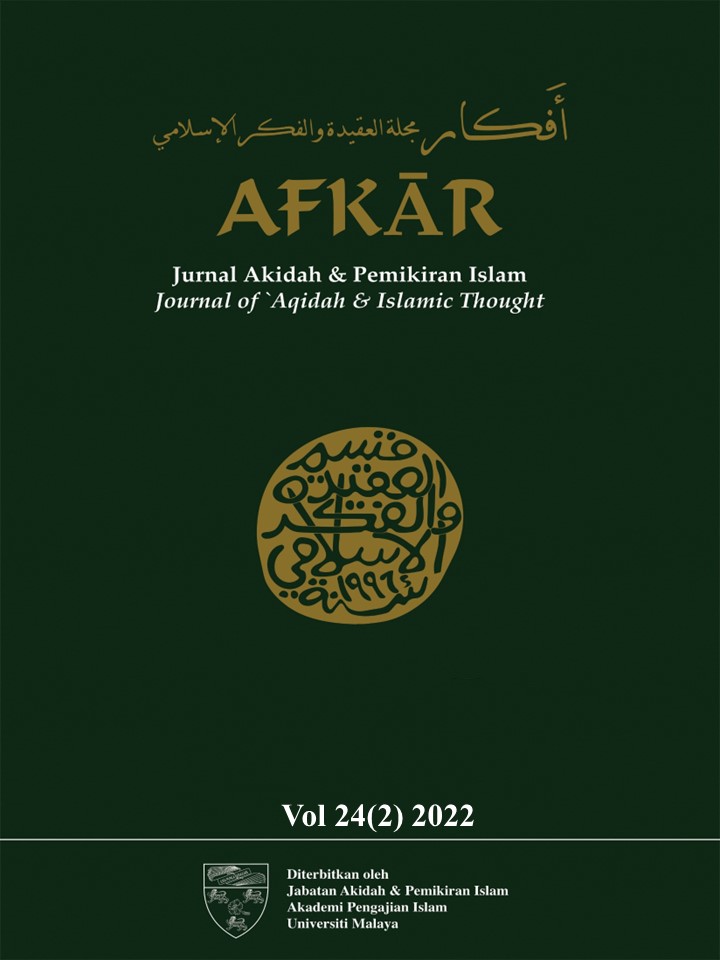The Popularizing of Sunni Doctrine in Southeast Asia: Sifat Dua Puluh in Malay Kitab Jawi in the 19th Century
Main Article Content
Abstract
Sifat Dua Puluh (twenty attributes of God) is a specific term of Malay to convey the doctrine of the Sunni school in Southeast Asia. Adapted from a renowned book of Yusuf al-Sanusi, Umm al-Barāhīn, this term began to appear in the 19th century as a leading Islamic theme in the kitab Jawi of Malay scholars in Mecca (Jawa). The scholars translated the book into Malay and expounded its contents in the form of commentaries (sharḥ), a rising style of writing kitab Jawi on the doctrine of the period. This article is to present a historical analysis of the way Sifat Dua Puluh became an established concept of Sunni theology in the Southeast Asian context, which served to convey the Sunni creeds in a popularly vernacular expression of the Muslims in the region. Sifat Dua Puluh was taken as the Islamic subject transmitted of the period, alongside the reprinting of kitab Jawi to disseminate the concept to Southeast Asia.
Downloads
Article Details

This work is licensed under a Creative Commons Attribution-NonCommercial 4.0 International License.
References
Abd Rahman. “Nawawi al-Batani: An Intellectual Master of the Pesantren Tradition.” Studia Islamika 3(3) (1996): 81-114.
Abdullah, Wan Mohd. Shaghir. Syeikh Daud bin Abdullah Al-Fathani: Ulama dan Pengarang Terulung Asia Tenggara. Kuala Lumpur: Hizbi, 1999.
Arnold, Thomas W. The Preaching of Islam: A History of the Propagation of Muslim Faith. London: Constable, 1913.
Asad, Talal. “The Idea of Anthropology of Islam.” Qui Parle 17(2) (2009): 1-31.
Al-Ashi, Muhammad Zayn ibn Faqīh Jalal al-Din. Bidayat al-Hidayah. Patani: Matba‘ah bin Halabi, n.d.
Azra, Azyumardi Azra. The Origins of Islamic Reformism in Southeast Asia: Networks of Malay-Indonesian and Middle Eastern ‘Ulama’ in the Seventeenth and Eighteenth Century. Australia & Honolulu: Allen & Unwin and University of Hawai’i Press, 2004.
Al-Banjari, Muhammad Tayyib ibn Mas‘ud. Miftah al-Jannah fi Bayan al-‘Aqidah. Patani: Matba‘ah bin Halabi, n.d.
van den Berg, L.W.C.. “Het Mohammedaansche godsdienstonderwijs op Java en Madoera en de daarbij gebruikte Arabische boeken.” Tijdscrift voor Indische Taal-, Land-, en Volkenkunde 31 (1886): 539-541.
Bradley, Francis R. Forging Islamic Power and Place: The Legacy of Shaykh Dā’ūd ‘Abd Allāh al-Faṭānī in Mecca and Southeast Asia. Honolulu: University of Hawaii Press, 2016.
Brockelman, C. Geschicte der Arabischen Litteratur, vol. 2. Leiden: E.J. Brill, 1949.
Bruckmayr, Philipp. Cambodia’s Muslims and the Malay World. Leiden; Boston: Brill, 2019.
Bruckmayr, Philipp. “The Sharḥ/Ḥāshiya Phenomenon in Southeast Asia.” Mélanges de l’Institut dominicain d’études orientales 32 (2017): 27-52.
van Bruinessen, Martin. “Kitab kuning: Books in Arabic Script Used in the Pesantren Milieu.” Bijdragen tot de Taal-, Land-, en Volkenkunde 146(2) (1990): 226-269.
Al-Edrus, Syed Muḥammad Dawilah. “The Role of Kitab Jawi in the Development of Islamic Thought in the Malay Archipelago with special Reference to Umm al-Barāhīn and the Writings on the Twenty Attributes.” Ph.D. Thesis, Edinburgh: University of Edinburgh, 1993.
Eickleman, Dale F.. “The Study of Islam in Local Context.” Contributions to Asian Studies 1(17) (1983): 1-16.
Al-Falimbani, Muhammad Azhari bin ‘Abd Allah. “‘Aṭiyah al-Raḥman fī Bayāni Qawā‘id al-Īmān.” In (the margin of) Sirāj al-Hudā. Patani: Matba‘ah bin Halabi, n.d.
Al-Fatani, Ahmad Fathy. Ulama Besar dari Patani. Kota Bharu: Majlis Ugama Islam dan Adat Istiadat Melayu, 2009.
Al-Fatani, Ahmad bin Muhammad Zayn. Faridat al-Fara’id fi ‘Ilm al-‘Aqa’id. Patani: Matba‘ah bin Halabi, n.d.
Al-Fatani, Dawud. Al-Durr al-Thamīn Pada Menyatakan I‘tiqad Segala Orang Mu’minin. Patani: Matba‘ah bin Halabi, n.d.
Al-Fatani, Zayn al-‘Abidin bin Muhammad. ‘Aqidah al-Najin fi ‘Ilm Usul al-Din. Patani: Matba‘ah bin Halabi, n.d.
Al-Fatani, Zayn al-‘Abidin bin Muhammad. Miftah al-Murid fi ‘Ilm al-Tawhid. Pulau Penang: Dar al-Ma‘arif, n.d.
Al-Fatani, Haji Abdullah bin Haji Ibrahim. ‘Umdat al-Talib al-Mujtahid fi Sharh Faridat al-Fara’id. Patani: Bin Halabi, n.d.
Hajjah Wan Yah binti Tuan Kadi Haji Wan Abdul Rahman. Sifat Dua Puluh pada Ilmu Tawhid. n.p: n.pb, n.d.
Ilyas, Ahmad Fauzi. Warisan Intelektual Ulama Nusantara. Medan: Rawda Publishing, 2018.
Iskandar, Teuku. Kesusasteraan Klasik Melayu Sepanjang Abad. Brunei: Universiti Brunei Darussalam, 1995.
Johns, A. H.. “Sufism as a Category in Indonesian Literature and History.” Journal of Southeast Asian History 2(2) (1961): 143-160.
Jusoh, Che’ Razi. “Preliminary Study on the Accounts of Some of the Malay-Jawi Aqidah Texts and Commentaries.” AFKAR: Jurnal Akidah & Pemikiran Islam 12 (2011): 21-46.
Kaptein, Nico J. G.. Islam, Colonialism and the Modern Age in the Netherlands East Indies: A Biography of Sayyid Uthman (1822-1914). Leiden: Brill, 2014.
Laffan, Michael. The Making of Indonesian Islam: Orientalism and the Narration of Sufi Past. Princeton and Oxford: Princeton University Press, 2011.
Madmarn, Hasan. The Pondok and Madrasah in Patani. Bangi: Universiti Kebangaan Malaysia, 1999.
Matheson, Virginia & Hooker, M. B.. “Jawi Literature in Patani: The Maintenance of an Islamic Tradition.” Journal of Malaysian Branch of the Royal Asiatic Society 16(1) (1988): 1-86.
Messick, Brinkley. The Calligraphic State: Textual Domination and History in a Muslim Society. Berkeley: University of California Press, 1996.
Morrison, G. E.. “The Coming of Islam to the East Indies.” Journal of Malaysian Branch of the Royal Asiatic Society 24(1) (1951): 31-37.
Rahimmula, Perayot. “The Patani Fatāwā: A Case Study of the Kitāb al-Fatāwa al-Faṭāniyyah.” Ph.D. Thesis, Canterbury: Kent University, 1992.
Snouck Hurgronje, C. Mekka in the Latter Part of the 19th Century. Leiden-Boston: Brill, 2007.
Spiegel, Gabrielle M.. “Introduction.” In Practicing History: New Directions in Historical Writing after the Linguistic Turn, ed. Spiegel, Gabrielle M.. New York: Routledge, 2005.
Al-Sumbawi, Muhammad Zayn al-Din bin Muhammad al-Badawi. Siraj al-Huda fi ‘Aqidah Ahl al-Taqwa. Patani: Matba‘ah bin Halabi, n.d.
Watt, W. Montgomery. The Formative Period of Islamic Thought. Edinburgh: Edinburgh University Press, 1973.

